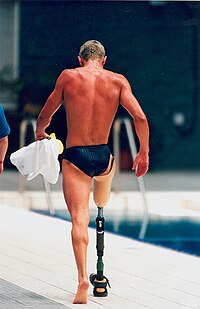
Photo from wikipedia
Virtual reality (VR) rehabilitation systems have been proposed to enable prosthetic hand users to perform training before receiving their prosthesis. Improving pre-prosthetic training to be more representative and better prepare… Click to show full abstract
Virtual reality (VR) rehabilitation systems have been proposed to enable prosthetic hand users to perform training before receiving their prosthesis. Improving pre-prosthetic training to be more representative and better prepare the patient for prosthesis use is a crucial step forwards in rehabilitation. However, existing VR platforms lack realism and accuracy in terms of the virtual hand and the forces produced when interacting with the environment. To address these shortcomings, this work presents a VR training platform based on accurate simulation of an anthropomorphic prosthetic hand, utilising an external robot arm to render realistic forces that the user would feel at the attachment point of their prosthesis. Experimental results with non-disabled participants show that training with this platform leads to a significant improvement in Box and Block scores compared to training in VR alone and a control group with no prior training. Results performing pick-and-place tasks with a wider range of objects demonstrates that training in VR alone negatively impacts performance, whereas the proposed platform has no significant impact on performance. User perception results highlight that the platform is much closer to using a physical prosthesis in terms of physical demand and effort, however frustration is significantly higher during training.
Journal Title: IEEE Robotics and Automation Letters
Year Published: 2022
Link to full text (if available)
Share on Social Media: Sign Up to like & get
recommendations!